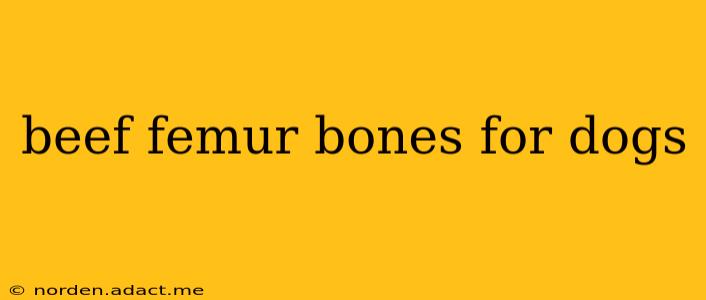Giving your dog a good chew is not only fun for them, but it also benefits their dental health and provides mental stimulation. Beef femur bones have become a popular choice among dog owners, but are they the right choice for your furry friend? This comprehensive guide will explore the benefits, risks, and everything you need to know before offering your dog a beef femur bone.
What are Beef Femur Bones?
Beef femur bones are the large, strong bones from a cow's leg. These bones are incredibly dense and durable, offering a long-lasting chew for powerful chewers. Unlike softer bones, beef femurs provide a significant challenge, satisfying a dog's natural instinct to gnaw and chew. The marrow inside is also a highly palatable treat, adding to their appeal.
Are Beef Femur Bones Safe for Dogs?
While beef femur bones offer many benefits, it's crucial to understand the potential risks. The safety of a beef femur bone depends heavily on its preparation and how your dog chews.
-
Raw vs. Cooked: Raw bones are generally considered safer than cooked bones. Cooked bones become brittle and can splinter, posing a choking hazard or causing internal injuries. Raw bones are more flexible and less likely to break into sharp pieces.
-
Size Matters: The size of the bone is crucial. A bone that's too large might be a choking hazard, while a bone that's too small could be swallowed whole. Always choose a bone appropriate for your dog's size and chewing strength. Smaller breeds will likely need smaller pieces of femur.
-
Supervision: Never leave your dog unsupervised with any bone, including a beef femur. Monitor their chewing to ensure they aren't swallowing large pieces or developing any signs of distress.
Benefits of Beef Femur Bones for Dogs
-
Dental Health: The act of chewing on a beef femur bone helps to clean your dog's teeth, scraping away plaque and tartar buildup. This can contribute to better oral hygiene and reduce the risk of dental disease.
-
Mental Stimulation: Chewing provides mental enrichment, keeping your dog occupied and preventing boredom. This is particularly beneficial for dogs prone to destructive chewing behaviors.
-
Nutrient-Rich: Beef femur bones contain essential minerals like calcium and phosphorus, beneficial for strong bones and teeth. The marrow inside is also a source of protein and other nutrients.
-
Satisfying Chew: The dense nature of the femur provides a long-lasting and satisfying chew, significantly more durable than many other chews.
What are the Risks of Giving My Dog a Beef Femur Bone?
-
Choking Hazard: The risk of choking is the most significant concern. Always supervise your dog while they are chewing and opt for appropriately sized bones.
-
Splintering (Cooked Bones): Cooked bones are brittle and prone to splintering, which can cause internal damage. Avoid cooked bones completely.
-
Gastrointestinal Issues: While rare, swallowing large bone fragments can lead to gastrointestinal upset, including vomiting or constipation.
-
Tooth Damage: Extremely hard bones, or bones with sharp edges, could potentially damage your dog's teeth.
How to Choose and Use Beef Femur Bones for Dogs
-
Source: Choose bones from a reputable source that guarantees the meat is human-grade and free from harmful chemicals or pesticides.
-
Size: Select a bone appropriate for your dog's size and chewing ability. Larger dogs need larger bones. You may even need to cut a femur into smaller sections for smaller dogs.
-
Supervision: Always supervise your dog while they are chewing.
-
Clean Up: Dispose of any leftover bone fragments responsibly.
What if my dog swallows a large piece of bone?
If you suspect your dog has swallowed a large piece of bone, contact your veterinarian immediately. They can advise you on the best course of action and may need to perform X-rays to assess the situation.
Are there alternatives to beef femur bones?
Yes, many other safe and nutritious chews are available for dogs, including bully sticks, dental chews, and other raw bones like knuckle bones or ribs. The best option depends on your dog's size, chewing habits, and preferences.
Are beef femur bones suitable for all dogs?
No, not all dogs are suitable candidates for beef femur bones. Puppies, senior dogs with dental issues, or dogs with known digestive sensitivities should be approached cautiously or perhaps offered alternatives. Always consult your veterinarian before introducing new chews to your dog's diet.
By carefully considering the risks and benefits, and by choosing and using beef femur bones responsibly, you can provide your canine companion with a healthy, stimulating, and enjoyable chewing experience. Remember, responsible pet ownership involves making informed decisions about your pet's health and well-being.
